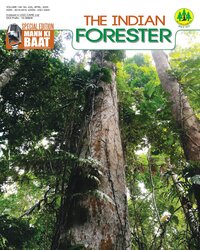Securing Zero Liquid Discharge (ZLD) in Molasses-Based Distilleries Located in Ganga Basin by Charter Action Plan
DOI:
https://doi.org/10.36808/if/2023/v149i4(A)/169905Keywords:
Sugar Cane Molasses, Spent-Wash, Pollution Load, Bio-Compositing, Incineration Boiler, Bare Minimum Technologies, CPU.Abstract
Increasing industrialization trend has resulted in the generation of industrial effluent in large quantities with high organic and Inorganic contents. Molasses based distilleries generate huge wastewater streams called spent wash. Spent wash is a highly organic as well as inorganic content effluent in nature generated in the distillery Industry. The spent wash from distilleries is unfit for direct discharge on land, irrigation as well as discharge Into rivers or streams. To control industrial pollution by distilleries in Ganga River, a holistic action plan was prepared in consultation with concerned stakeholders.
During 19th episode of Mann Ki Baat (MKB) Hon'ble Prime Minister (PM) of India mentioned about the formulation of action plan for control of water pollution by distillery industries in River Ganga and he also acknowledged about the attainment of Zero Liquid Discharge by Distilleries in Uttarakhand (UK) and Uttar Pradesh (UP).
Central Pollution Control Board (CPCB) discussed environmental Issues pertaining to distillery sector with various stakeholders and formulated Charter Action Plan during 2017 for upgradation of manufacturing process technology, effluent treatment system to ensure adoption of best practices for effective spent wash management by distilleries. The Charter is aimed at facilitating distilleries to shift from an end-of-pipe treatment approach to an integrated water and waste management system. As a result of Charter action plan, 63 molasses-based distilleries located in main stem of Ganga River has achieved ZLD which has resulted in reduction of specific fresh water consumption from 15 KL/KL of alcohol produced in 2016-17 to 5.59 KL/KL of alcohol produced in 2021-22, leading to a 62.7% reduction in specific fresh water consumption. Similarly, specific spent wash generation has reduced from 11.1 KL/KL of alcohol produced in 2016-17 to 6.48 KL/KL alcohol produced in 2021-22, leading to 41.6% reduction in spent wash generation.
References
Bhardwaj S., Ruhela M., Bhutiani R. and Ahamad F. (2019). Distillery spent wash (DSW) treatment methodogies and challenges with special reference to incineration: An overview. Environment Conservation Journai, 20(3): 135-144. https://doi.org/10.36953/ecj.2019.20318.
Charter for Zero Liquid Discharge (ZLD) in Molasses Based Distilleries, Central Pollution Control Board, charter_distillery.pdf (cpcb.nic.in).
CPCB Guidelines- Techno-economic feasibility of implementation of Zero Liquid Discharge for water polluting industries, 2014.
Ghosh Ray S. and Ghangrekar M.M. (2018). Comprehensive review on treatment of high-strength distillery wastewater in advanced physico-chemical and biological degradation pathways. International Journal of Environmental Science and Technology, 16(1): 527-546. https://doi.org/10.1007/s13762-018-1786-8.
Umair Hassan M., Aamer M., Umer Chattha M., Haiying T, Khan I., Seleiman M.F., Rasheed A., Nawaz M., Rehman A., Talha Aslam M., Afzal A. and Huang G. (2021). Sugarcane Distillery Spent Wash (DSW) as a Bio-Nutrient Supplement: A Win-Win Option for Sustainable Crop Production. Agronomy, 11(1): 183. https://doi.org/10.3390/agronomy11010183.
Downloads
Downloads
Published
How to Cite
Issue
Section
License
Unless otherwise stated, copyright or similar rights in all materials presented on the site, including graphical images, are owned by Indian Forester.





